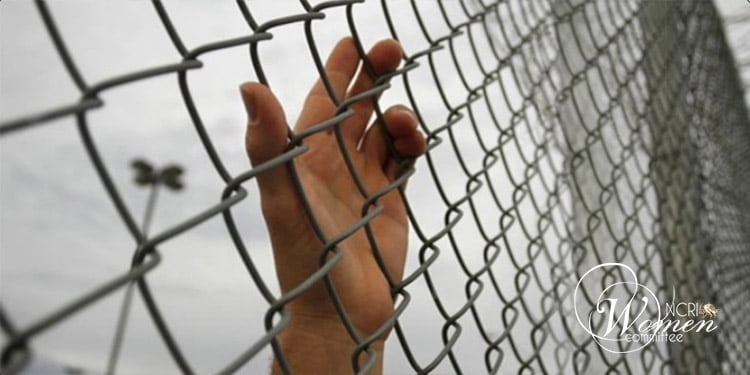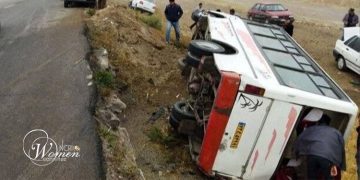From the memoir by Hengameh Haj Hassan – Part 11
⚠️ Content Warning: This section of Face to Face with the Beast contains descriptions of torture, violence, and executions in prison.
In the previous part of Face to Face with the Beast, Hengameh recounted the tragic fate of Nahid Izadkhah, whose body was destroyed under torture, and of her sister-in-law, Masoumeh Azdanlou, who despite being severely injured and pregnant was executed along with her unborn child. In this installment, Hengameh recalls the story of a much younger prisoner: Fatemeh Moushaei, affectionately known as “Little Fati.”
Little Fati
One or two days after I entered the general ward of Evin Prison, a small and lively girl came up to me and asked: “You came from 209?”[1]
I said yes. She said: “Do you know my mom? Her name is Tal’at.”
Suddenly I remembered Tal’at, the worried mother who had been desperate about her little girl, Fatemeh.
“Are you Fatemeh?” I asked.
At once she threw her arms around my neck and said: “You were with my mom? You saw her?” She kept talking and could hardly stand still from excitement. She looked far younger than her real age.
I told her: “Your mother was released from there. She was worried about you, and I’m sure she’s looking for you right now.”
She answered: “They arrested me one day after my mom and brought me here. My interrogator is very cruel and keeps saying he will execute me!”
I told her: “Nonsense! He just wants to scare you.”
She was truly far too young to be executed—her “crime” nothing more than playing sports at school, or whatever other absurd excuse that stupid interrogator might invent.
From then on, Fatemeh stuck to me like glue. I felt she was trying to fill the void of needing her mother with me. She would talk to me, joke with me, confide in me, ask me for advice, and sleep beside me holding my hand until she drifted off. I loved her dearly, understood her need, and tried my best to help her.
Each time she returned from interrogation, she would tell me her interrogator only threatened her. Yet she remained mischievous and playful in the ward, which is why the girls nicknamed her Fati the Mouse—both because she was tiny and quick like a mouse, and because her family name was Moushaei.[2]
How Fati Was Taken to Execution
One morning, just before noon, the loudspeaker called three names: Zahra Hesami,[3] Fatemeh Moushaei, and another prisoner.
When I heard Fatemeh’s name, my heart dropped. I froze in shock, unable to believe what I’d just heard. I looked at the others to see if I was mistaken. But no—it was true.
A heavy silence fell over the ward. Everyone knew: names read like this meant execution. Zahra rose calmly, smiling as the girls silently wept while saying goodbye.
Zahra had been a university student at the Tehran University of Science and Technology. She was composed and kind, always laughing at my jokes, and constantly encouraging me to keep speaking up, to keep everyone’s spirits alive through group activities, exercise, collective poetry readings, and so on.
I couldn’t move toward her, but she came to me, shook me, and said: “You are not allowed to cry.” She wiped my tears and added: “Remember—you must always smile. Don’t let the girls grow silent. Never forget this! The enemy must never see our tears.” Then she left.
But Fati…
I saw her rush in, holding her shoes in her hand, struggling to keep her scarf on her head as she ran to our room. Overjoyed, she threw her small arms around my neck and exclaimed: “They’re transferring us to Ghezel Hesar Prison![4] I wish you were coming too!”
I forced myself to smile and said: “Yes, you’re going to Ghezel.” She ran out toward the hallway. I couldn’t bring myself to follow her. In an instant, all I could hear was the commotion, the crying of the girls calling her name. I collapsed against the wall by the door, sobbing uncontrollably, unable to stop.

Her sadistic interrogator had chosen to take out his animalistic vengeance on little Fati. I never understood why.
As she ran toward the “Zir-e Hasht”,[5] Fati suddenly noticed the silence and sorrow of the girls. She stopped short, looked around more deeply, and at once realized the truth. I heard her terrified scream pierce the air: “No! I don’t want to die! I don’t want to die!”
Moments later she fainted, collapsing on the ground. She was far too young to be ready for death—she had not even tasted life yet. Khomeini’s henchmen dragged her unconscious body away as the girls screamed her name: “Fati! Fati! No… no…!”
I too screamed inside, through my sobs: Why? Why, executioners? Even by your own barbaric “laws,” what had this little girl done to deserve death? My little Fati was still thirsty for a mother’s love and tenderness.
Oh God, why? Why?
[1] 209 – A notorious ward inside Evin Prison used for solitary confinement, interrogations, and torture.
[2] Fatemeh Moushaei (“Little Fati”) – A young political prisoner executed while still a child.
[3] Zahra Hesami – A university student and political prisoner executed in the early 1980s.
[4] Ghezel Hesar Prison – One of Iran’s largest prisons, located in Karaj, infamous for mass executions.
[5] Zir-e Hasht – The main hallway and control area of Evin Prison, where prisoners were called for interrogation, torture, or execution.
























